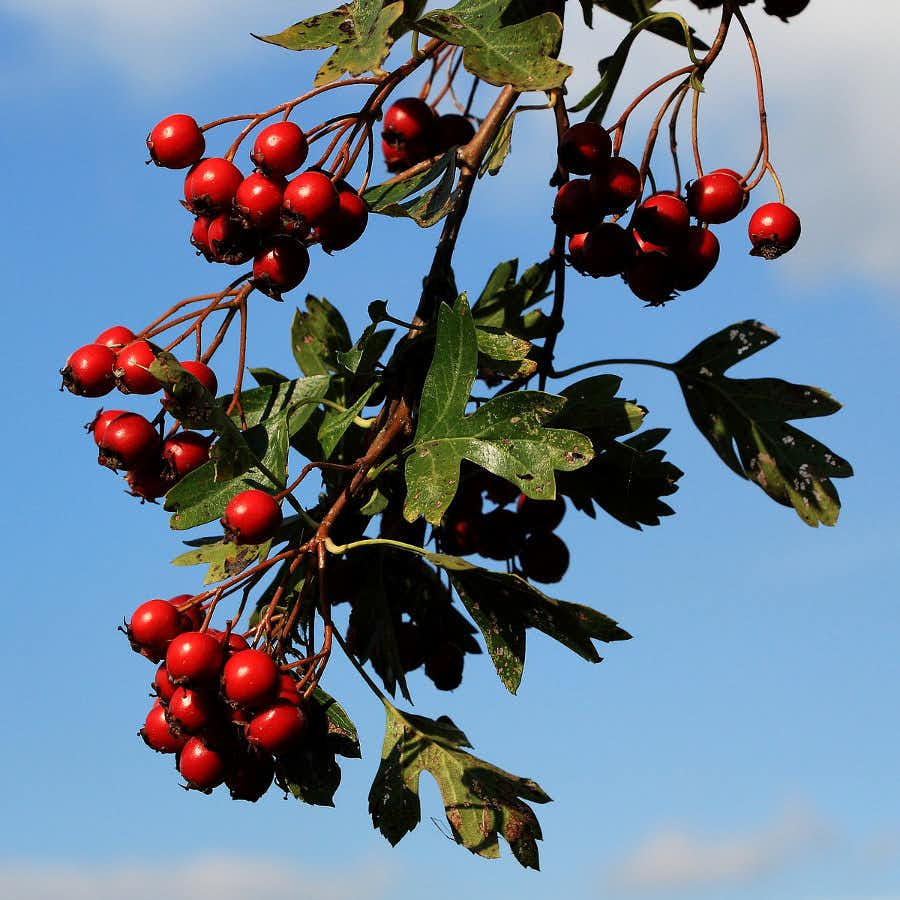
Hawthorn (Crataegus laevigata) is a small thorny tree with white flowers and red berries that grows in England and throughout Europe. C. laevigata is only one species; related species have slightly different chemical profiles. Knowledgeable herbalists use them for similar purposes, however.
History of Hawthorn:
Although hawthorn was known and used by the Greek physician Dioscorides, it became popular in Europe and the United States toward the end of the nineteenth century.
In countries such as Germany where doctors prescribe herbs and supervise their use, experts recommend hawthorn to treat angina and the early stages of congestive heart failure (New York Heart Association grades I and II).
In the United States, where herbs are utilized primarily as home remedies, fewer people know about hawthorn. Cardiac insufficiency of any degree is not generally considered amenable to hit-or-miss self-treatment, so anyone who chooses to use hawthorn should be monitored carefully.
The portions of the plant used are the leaves, flowers, and berries (haws), standardized for their procyanidin content.
Active Ingredients:
Hawthorn flowers, leaves and berries contain from 1 to 3 percent of compounds called oligomeric procyanidins, also called pycnogenols or leucoanthocyanidins.
There are also flavonoids making up about 1 or 2 percent of the herb. The flowers and fruits are richest in total flavonoids and also contain the most hyperoside.
Leaves of C. monogyna also contain measurable amounts of vitexin-rhamnoside. Rutin, other flavonoids, and glycosylflavones are found in much smaller quantities.
Other components include purines, sterols, and amines, some of which may stimulate the heart. In addition, there are orientin glycosides, cyanogenetic glycosides, and saponins.
Uses of Hawthorn:
Hawthorn dilates blood vessels. This activity helps lower blood pressure, and because it also dilates the coronary vessels, the likelihood of angina is reduced. It does not act quickly enough to help once an episode of angina has begun. A separate effect on the heart develops quite slowly, but is favorable, like a mild “heart tonic.”
Animal studies suggest that hawthorn extracts can also reduce cholesterol and triglyceride levels. It may also have a normalizing effect on blood sugar, although it is not considered appropriate for treating diabetes.
In Germany, doctors prescribe hawthorn extract for certain irregular heart rhythms. Companies may also include it as a component in some geriatric tonics intended for aging hearts that do not yet require digitalis.
Hawthorn extract inhibits thromboxane production (so it might be expected to reduce the risk of blood clots) and also has antioxidant properties.
Dose:
The daily dose ranges from 160 mg to 900 mg of hawthorn extract, supplying from 4 to 20 mg of flavonoids (standardized) and 30 to 160 mg of oligomeric procyanidins.
The minimum daily dose should supply 5 mg of flavones (calculated as hyperoside), 10 mg of total flavonoids (again, calculated as hyperoside), or 5 mg of oligomeric procyanidins (calculated as epicatechin).
If the leaves and flowers themselves are used rather than a standardized extract, a tea is made by pouring 2/3 cup of boiling water over a teaspoonful of herb, steeping for twenty minutes, and straining. Two cups a day of such a tea constitutes a usual dose.
The dried herb must be stored in a tightly closed container away from light to preserve its potency.
A treatment period of six weeks is necessary to determine whether hawthorn is having the desired effect. The supervising physician should adjust the dosage as needed.
Special Precautions:
Hawthorn extract can reduce uterine tone and should be avoided during pregnancy.
People with serious heart problems and those on other heart or blood pressure medicines should consult their physicians before starting to take hawthorn.
Anyone taking hawthorn must have their blood pressure and heart function monitored.
Adverse Effects:
At normal doses, no side effects have been reported. At very high doses, animals become sedated, and people might experience symptoms of low blood pressure, such as dizziness.
Possible Interactions:
Hawthorn extracts may increase the activity (but not necessarily the toxicity) of other cardiac tonics such as digitalis. It is not recommended for people whose heart condition is serious enough that they need Lanoxin or other digoxin medications.
Although no other interactions have been reported, prudence suggests caution if hawthorn is to be combined with other heart or blood pressure drugs (such as nitrates or calcium channel blockers).
Since hawthorn inhibits thromboxane synthesis, it may be incompatible with aspirin, which has a similar action. If a person takes hawthorn extract together with an anticoagulant such as warfarin (Coumadin), careful monitoring of bleeding time (through PT and INR) is essential. Please discuss these possible interactions with a physician.
Will Hawthorn Prevent Bruising?
Q. I have rambunctious dogs. They love to greet me in the morning with lots of tail wagging and wrestling. This sometimes leads to red bruises on my hands. They are unbecoming and it takes a week or more for them to disappear. Is there an herb that might make my capillaries stronger and less like to bruise?
A. An herb called hawthorn in English (Crataegus in Latin) has been used in Chinese medicine for 1300 years. While the principles of Chinese medicine are different, scientific research supports the use of hawthorn for cardiovascular health. In addition to antioxidant activity, this herb can help protect the lining of blood vessels (Frontiers in Pharmacology, Feb. 21, 2020).
The authors note that we still need high-quality clinical trials to confirm the benefits of hawthorn leaf extract in cardiovascular disease. If you decide to run your own N of 1 experiment, please let us know if hawthorn reduces your tendency to bruise.
If you choose to take hawthorn extract, you will want a high quality product. Gaia Herbs is the source we turn to for the best quality in herbal preparations. Gaia Herbs as a sponsor of our People’s Pharmacy podcasts.

